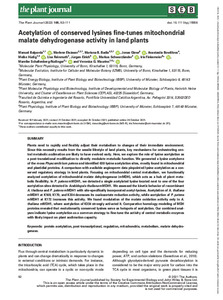Please use this identifier to cite or link to this item:
https://repositorio.uca.edu.ar/handle/123456789/15419| Título: | Acetylation of conserved lysines fine-tunes mitochondrial malate dehydrogenase activity in land plants | Autor: | Balparda, Manuel Elsasse, Marlene Badía, Mariana B. Giese, Jonas Bovdilova, Anastasiia Hüdig, Meike Reinmuth, Lisa Eirich, Jürgen Schwarzlander, Markus Finkemeier, Iris Schallenberg Rüdinger, Mareike Maurino, Verónica G. |
Palabras clave: | PLANTAS; ACETILACIÓN DE PROTEINAS; POSTRANSCRIPCIONAL; REGULACION; ACETILACION DE PROTEINAS; MITOCONDRIAS; METABOLISMO; MALATO DESHIDROGENASA | Fecha de publicación: | 2022 | Editorial: | Society for Experimental Biology | Cita: | Balparda, M. et al. Acetylation of conserved lysines fine-tunes mitochondrial malate dehydrogenase activity in land plants [en línea]. The Plant Journal. 2022, 109 (1). doi: 10.1111/tpj.15556. Disponible en: https://repositorio.uca.edu.ar/handle/123456789/15419 | Resumen: | Summary: Plants need to rapidly and flexibly adjust their metabolism to changes of their immediate environment. Since this necessity results from the sessile lifestyle of land plants, key mechanisms for orchestrating central metabolic acclimation are likely to have evolved early. Here, we explore the role of lysine acetylation as a post-translational modification to directly modulate metabolic function. We generated a lysine acetylome of the moss Physcomitrium patens and identified 638 lysine acetylation sites, mostly found in mitochondrial and plastidial proteins. A comparison with available angiosperm data pinpointed lysine acetylation as a conserved regulatory strategy in land plants. Focusing on mitochondrial central metabolism, we functionally analyzed acetylation of mitochondrial malate dehydrogenase (mMDH), which acts as a hub of plant metabolic flexibility. In P. patens mMDH1, we detected a single acetylated lysine located next to one of the four acetylation sites detected in Arabidopsis thaliana mMDH1. We assessed the kinetic behavior of recombinant A. thaliana and P. patens mMDH1 with site-specifically incorporated acetyl-lysines. Acetylation of A. thaliana mMDH1 at K169, K170, and K334 decreases its oxaloacetate reduction activity, while acetylation of P. patens mMDH1 at K172 increases this activity. We found modulation of the malate oxidation activity only in A. thaliana mMDH1, where acetylation of K334 strongly activated it. Comparative homology modeling of MDH proteins revealed that evolutionarily conserved lysines serve as hotspots of acetylation. Our combined analyses indicate lysine acetylation as a common strategy to fine-tune the activity of central metabolic enzymes with likely impact on plant acclimation capacity. | URI: | https://repositorio.uca.edu.ar/handle/123456789/15419 | ISSN: | 0960-7412 1365-313X (online) |
Disciplina: | CIENCIAS AGRARIAS | DOI: | 10.1111/tpj.15556 | Derechos: | Acceso abierto | Fuente: | The Plant Journal Vol.109, No,1, 2022 |
| Appears in Collections: | Artículos |
Files in This Item:
| File | Description | Size | Format | |
|---|---|---|---|---|
| acetylation-conserved-lysines-fine.pdf | 1,99 MB | Adobe PDF |  View/Open |
Page view(s)
75
checked on Apr 27, 2024
Download(s)
185
checked on Apr 27, 2024
Google ScholarTM
Check
Altmetric
Altmetric
This item is licensed under a Creative Commons License

